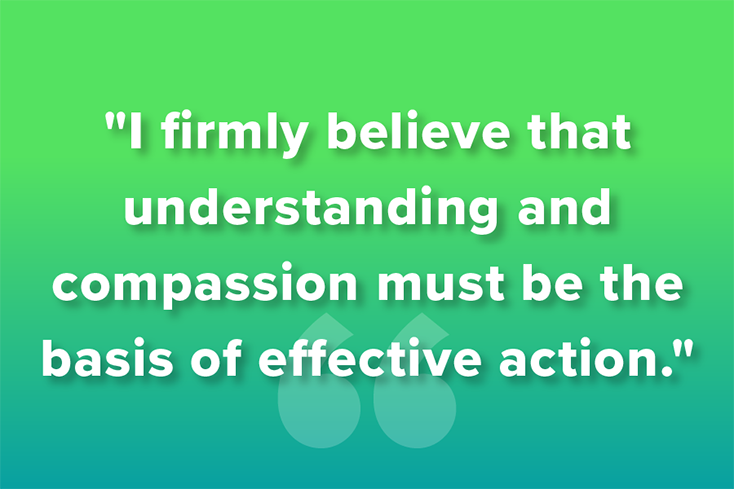September 28, 2023
By Shrushti Chauhan
If you or someone you know is experiencing a mental health, suicide or substance use crisis or emotional distress, reach out 24/7 to the 988 Suicide and Crisis Lifeline (formerly known as the National Suicide Prevention Lifeline) by dialing or texting 988 or using chat services at 988lifeline.org to connect to a trained crisis counselor. You can also get crisis text support via the Crisis Text Line by texting NAMI to 741741.

When you have depression, it’s like it snows every day. Some days, it’s only a couple of inches. It’s a pain in the ass, but you still make it to work, to the grocery store. Sure, maybe you skip the gym or your friend’s birthday, but it is still snowing, and who knows how bad it might get tonight? It’s probably better to just head home. Your friend notices, but probably thinks you’re flaky now or inconsiderate.
Some days, it snows a foot. You spend an hour shoveling out your driveway and are late to work. Your back and hands hurt from shoveling. You leave early because it’s coming down out there. Your boss notices.
Some days it snows four feet. You shovel all morning, but your street never gets plowed. You’re not making it to work, or anywhere else, for that matter. You’re so sore and tired that you just got back into bed. By the time you wake up, all your shoveling has filled back in with snow. It looks like your phone rang; people are wondering where you are. You don’t feel like calling them back; you’re too tired from all the shoveling. Plus, they don’t get this much snow at their house, so they don’t understand why you’re still stuck at home. They just think you’re lazy or weak, although they rarely come out and say it.
Some weeks, it’s a full-blown blizzard. When you open your door, it’s to a wall of snow. The power flickers and then goes out. It’s too cold to sit in the living room anymore, so you get back into bed with all your clothes on. The stove and microwave won’t work, so you eat a cold pop-tart and call that dinner. You haven’t taken a shower in three days, but how could you at this point? You’re too cold to do anything except sleep.
Sometimes people get snowed in for the winter. The cold seeps in. No communication in or out. The food runs out. What can you do — tunnel out a forty-foot snowbank with your hands? How far away is help? Can you even get there in a blizzard? If you do, can they even help you at this point? Maybe it’s death to stay here, but it’s death to go out there, too.
The thing is, when it snows all the time, you get worn down. You get tired of being cold. You get tired of hurting all the time from shoveling, but if you don’t shovel on the light days, it builds up to something unmanageable on the heavy days. You resent the hell out of the snow, but it doesn’t care; it’s just blind chemistry, an act of nature. It carries on regardless, unconcerned and unaware if it buries you or the whole world.
Also, the snow builds up in other areas, places you can’t shovel, and sometimes places you can’t see. Maybe it’s on the roof. Maybe it’s on the mountain behind the house. Sometimes, there’s an avalanche that blows the house right off its foundation and takes you with it. Without a veritable act of God, nothing can be done. The neighbors say it’s a shame, and they can’t understand it; he was doing so well with his shoveling.
I don’t know how it went for Kate Spade or Sushant Singh Rajput. It seems like they got hit by the avalanche, but it could’ve been the long, slow winter. Maybe they were keeping up with their shoveling, or maybe they weren’t. Sometimes, shoveling isn’t enough anyway.
It’s hard to tell from the outside, but it’s important to understand what it’s like on the inside. I firmly believe that understanding and compassion must be the basis of effective action. It’s important to understand what depression is, how it feels and what it’s like to live with it. This is how we can help people both on an individual and a policy basis. It’s not sharing trauma just to make someone uncomfortable. I know it feels gross to read it, and realistically, it can be unpleasant to be around it, that’s why people pull away.
I don’t have a message for people with depression like “Keep shoveling.” My message is to everyone else. Grab a shovel and help your neighbor. Slap a mini snow plow on the front of your truck and plow your neighborhood. Petition the city council to buy more salt trucks, so to speak.
Depression is blind chemistry and physics, like snow. And like the weather, it is a mindless process, powerful and unpredictable, with great potential for harm. But that doesn’t mean we are helpless. If we want to stop losing so many people to this disease, it will require action at every level.
We’re always accepting submissions to the NAMI Blog! We feature the latest research, stories of recovery, ways to end stigma and strategies for living well with mental illness. Most importantly: We feature your voices.
LEARN MORENAMI HelpLine is available M-F, 10 a.m. – 10 p.m. ET. Call 800-950-6264,
text “helpline” to 62640, or chat online. In a crisis, call or text 988 (24/7).